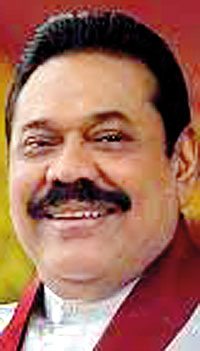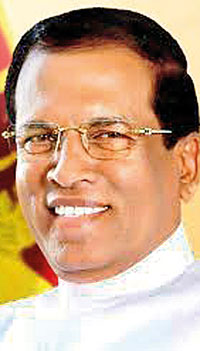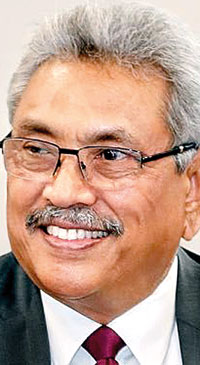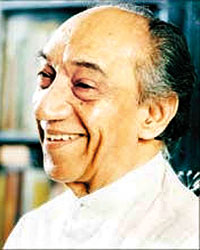Columns
Will the new constitution be worse than the known devil?
 Ever since President Chandrika Bandaranaike Kumaratunga damned the present J.R. Jayewardene constitution in the late 90’s as a ‘bahubhutha’ or the devil’s constitution, the notion has festered in the collective public conscious that the stumbling block preventing Lanka’s leap to prosperity from the pits of poverty is the 1978 supreme charter.
Ever since President Chandrika Bandaranaike Kumaratunga damned the present J.R. Jayewardene constitution in the late 90’s as a ‘bahubhutha’ or the devil’s constitution, the notion has festered in the collective public conscious that the stumbling block preventing Lanka’s leap to prosperity from the pits of poverty is the 1978 supreme charter.

CHANDRIKA: 17A in 2001 to ‘bahubhutha constitution'
Since then, every successive leader, whilst remorselessly enjoying the untrammeled powers of an executive presidency the disparaged constitution bestows upon the incumbent under its articles, has condemned it as the bane of Lanka that prevents her forward march toward the Elysian Fields, and vowed to see it abolished during their tenure of office.
They have piled upon the constitution all the failures, the incompetence, the inefficiencies and accumulated sins of the government, and used it as a convenient whipping boy to absolve themselves from their transgressions in the manner ‘a goat was sent, in the days of yore, to the wilderness on the Day of Atonement as a symbolic bearer of the sins of the people’.
But this Lankan scapegoat was not for summary dispatch to the forest, not for it to be dumped into dustbin’s oblivion but to be kept manacled to the pen and be mercilessly fleeced when a people’s winter of discontent demanded more government insulation to protect it from frosty winds.

MAHINDA: 18A in 2010 to strengthen people power
While other nations religiously worshipped their constitutions and held blasphemous any attempts to discredit it,
- while America wrote it with the blood of the fallen in 1789 after her war of independence and, along with the Bill of Rights enshrined therein two years later, consecrated it in the public conscious to revere and to uphold;
- whilst Britain carries on swimmingly with her unwritten constitution fortified with the matured wine of her trail blazing 13th century Magna Carta;
- while France’s ‘viva la libre’ resonates throughout her 1958 Charles de Gaulle mooted Constitution of the Fifth Republic which pays worship to the 1789 revolution’s Declarations of the Rights of Man and of the Citizen,
Sri Lanka’s 1978 Constitution, which embodies and sanctifies fundamental human rights, is decried, debased and denigrated, dumped unto the dust to be traduced and trampled but, nevertheless, retrieved, dusted and reused whenever it is advantageous for its double tongued leaders to do so.
It is a remarkable trait found in our leaders that they have an extraordinary propensity to exploit to the full the very thing they most condemn and publicly appear to hold with the utmost contempt. And show neither distaste nor shame nor any qualm in doing so.

MAITHRIPALA: 19A in 2015 to curb presidential power
However, such is the churned hatred towards the branded scourge, the antipathy taken root in the nation’s mind-set has made all progressive forces rally around the strident call for its abolishment, especially the elimination of the obnoxious office of executive presidency. But like the Mahawamsa Chronicles is woven around its glorified hero, Dutugamunu, so does the constitution revolve around its central figure, the executive president, and to banish the exalted grandee from the cast and script, would be akin to playing Hamlet without the Prince.
Bowing to public calls, President Chandrika Kumaratunga allowed a chink to appear in the presidential armour by legislating the 17th Amendment to the Constitution. A ray of light shone through the crack to illumine the hopes of constitutional reformists that change lay close at hand.
Chandrika’s sacrificial act, during her second term of office as President in October 2001, of surrendering her sweeping powers to appoint or dismiss chairmen or members to over 7 vital commissions — namely, (a) The Election Commission (b) The Public Service Commission,(c) The National Police Commission, (d) The Human Rights Commission of Sri Lanka, (e) The Permanent Commission to Investigate Bribery, (f) The Finance Commission and (g) The Delimitation Commission — was laudable and her loss was the public’s gain. It strengthened the institutional pillars of democracy and removed its operations beyond the pale of presidential intervention and placed Lanka on course to becoming a modern democratic state.

GOTABAYA: 20A in 2020 to fortify presidential power and new constitution soon
What the ground breaking 17th Amendment did was to set up a Constitutional Council comprising the Prime Minister, the Speaker, the Leader of the Opposition, five persons appointed by the President nominated by both Prime Minister and Opposition Leader, and one person nominated by Parliamentary members who belongs to a party other than the Prime Minister’s or the Opposition Leader’ party.
The 17th Amendment further provided no person shall be appointed by the President as the Chairman or a member of any of these Commissions, except on a recommendation of the Council. Furthermore, it held that no person so appointed shall be removed except as provided for in the Constitution or in any law, and where no such provision is made, such person shall be removed by the President only with the prior approval of the Council. It also specified that the appointment, promotion, transfer, disciplinary control of public officials be vested in the Commissions.
When it came to the appointment of Supreme and Appeal Court Judges, the President’s recommendations had to be approved by the Constitutional Council.
But the halcyon days of the 17th Amendment which had kindled the hope that presidential powers could be trimmed and customized to harmonize with the legislative and judicial branches of the state, were sadly numbered. It was as fleeting as the newly fallen snow in the minds of optimists who had romanced the notion good times last forever.
With the 30 year war over, and flushed with triumph, Mahinda Rajapaksa romped home to a second presidential victory and immediately set about to restore the executive Presidency to its glorious pristine state, and to enjoy in peace what was denied to him in war: the unbridled powers that flowed from its fount before the passage of the 17th Amendment to the Constitution.

JR: Architect of the 1978 Constitution
Exactly 9 years after Chandrika’s 17th Amendment, the lights went out on Sri Lanka’s fragile, fledgling democracy, still struggling to take wing. In September 2010, the 18th Amendment was passed in Parliament. It repealed the 17th Amendment, rolling back the advances made to check presidential power.
The government’s justification, at the time, was that the 18th Amendment was essential to strengthen and enlarge the democratic and sovereign rights of the people. But all it did was to fortify the executive presidency even more and concentrate all power in one man and make it absolute.
Among others, the 18th Amendment replaced the 10-member Constitutional Council with a five-member Parliamentary Council comprising the Prime Minister, the Speaker, Leader of the Opposition and two Members of Parliament nominated by the Prime Minister and Leader of the Opposition.
Unlike the 17th Amendment which had empowered the President to appoint chairmen and members to the listed commissions above mentioned, only on the recommendation of the Constitutional Council, the 18th Amendment gave carte blanch power to the President to appoint the chairman and members to these 7 commissions after seeking the observations of the Parliamentary Council. The Council’s observations had to be conveyed to the president within a week. Failure by the Council to convey its observation to the President within this one week period, empowered the president to confirm the appointment. And, anyway, the Council’s observations did not bind the president.
It also removed the two-term limit for a twice elected President to be eligible for office thereafter, thus paving the way for Mahinda Rajapaksa to seek re-election in perpetuity.
But as his second term approached its end, the initial post-war euphoria that had greeted his second advent, had begun to wane, and the winds of change began to blow. The Constitution with its overriding powers fell out of favour with the executive presidency blamed for its worst excesses.
Civil rights groups led by the monk, the Venerable Sobitha Thera, took up the rallying cry, ‘Down with the executive presidency,’ and made it the central theme of the election campaign, which saw the joint opposition candidate pip past the polls post to land the coveted office he had sworn to abolish — or, at
least, to reduce its excessive powers to better suit the mortal bearer, and let the crown rest more lightly on his head.
If the new president, Maithripala Sirisena could not succeed in abolishing the executive presidency without simultaneously making himself redundant, he did his best to have the cake and eat it too by cutting down on the icing.
The 19th Amendment he introduced before his new found throne had got warm and become far too enchanting to resist, repealed Mahinda Rajapaksa’s 18th Amendment and diluted presidential powers. The Constitutional Council was resurrected, the independent commissions were restored, the abhorrent presidential powers were restricted and, in the new amendment, the 17th Amendment found new birth and resonance.
Sirisena had also clipped his presidential wings by removing from his arsenal of powers, the right to dismiss his prime minister once appointed. He had also abdicated his right to appoint or dismiss his cabinet ministers without first seeking the advice of the Prime Minister.
So drastic was the reduction made to the array of powers reposing in the Presidential urn, that some wondered whether the 19th Amendment had truly returned Sri Lanka’s system of government to a virtual Parliamentary democracy, with a eunuchised President rendered scarcely more than a symbolic mascot of national unity.
But to Sirisena’s lasting credit, he has been the only executive president of Lanka who had made the supreme sacrifice, short of ending his life prematurely, to have willingly pruned the mandated six year tenure of office to five. The 19th Amendment which, among others, restored the two term limit for twice elected Presidents, had, indeed, pushed the frontier forward.
But the new ground gained was soon lost five years later when a reversal of fortune struck the Yahapalana legacy. Enough that its erstwhile coalition partner going it alone at the 2019 presidential hustings had lost badly to SLPP’s candidate Gotabaya Rajapaksa who swept the polls with 6.9 million votes, but it fared even worse in the 2020 August general election and was almost voted out of existence.
In the euphotic clamour for expectant change from the bungling Yahapalana Sirisena-Wickremesinghe odd couple partnership, the aversion to a strong executive president with a magic wand or a studded jackboot to effect immediate miracles, was forgotten under the usual Lanka spell of amnesia, with a senior Buddhist monk publicly stating ‘We want a Hitler.’
The SLPP, in its relentless quest to accumulate even more power to dawn the vistas of prosperity and splendour as promised in its presidential manifesto, had eagerly sought for a deciding two-thirds majority. The SLPP, with the SLFP and a few minor parties tagging along as sidekicks, narrowly failed by five seats to clinch the magic two-third. But no matter. They knew they could easily marshal the necessary two thirds to enact the ambitious constitutional amendment by simply coaxing a few errant members of the opposition to turncoat and join ranks.
The 19th Amendment frontier was once again pushed back in this ping-pong game of constitutional thrones, when the 20th Amendment was passed in October 2020. This repealed the progressive 19th Amendment and restored the previous Rajapaksa regime’s 18th Amendment almost in toto.
Its purpose was to resurrect the entire gamut of powers and strengthen immeasurably the Executive Presidency which the 19th Amendment had considerably weakened.
The justification for this consolidation of executive power in the executive branch of State was that such fortification was indispensable to give effect to the party’s manifesto promises and to expedite development. But the powers of the 20th Amendment soon seemed not enough to bring Lanka nearer to El Dorado.
Once more J.R. Jayawardena’s 1978 constitution appeared the stumble block to the nation’s forward drive. What the need of the hour demanded according to the SLPP was not to tinker with the old JR jalopy and make piecemeal repairs at pit stops but to style anew a custom made, purpose built Rajapaksa model to cruise splendidly on top gear to the desired destination
President Gotabaya Rajapaksa on Sunday assured that steps would be taken to introduce a new constitution as promised to the people. On Monday SLPP National List MP Gevindu Cumaratunga said he expected Gotabaya Rajapaksa to keep his promise to unveil the draft of
his proposed new constitution before the second anniversary
of his presidency.
But it is not whether the President sticks to his promise to unveil a draft of the constitution by a certain date that matters but whether the new constitution will dawn the rainbowed vistas of prosperity as promised?
Or whether, as constitutions go, the new constitution will turn out to be, when unveiled and plugged, the panacea for all ills or just another placebo, a pep up popper to give that fleeting top of the world feeling that all is well? Or worse? Whether the nation will find in the New Testament the unknown angel infinitely more evil than the known devil?


Leave a Reply
Post Comment